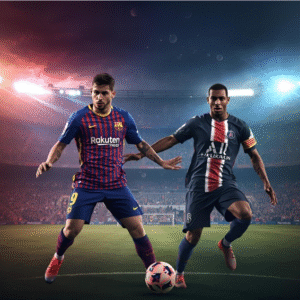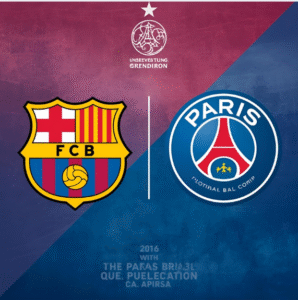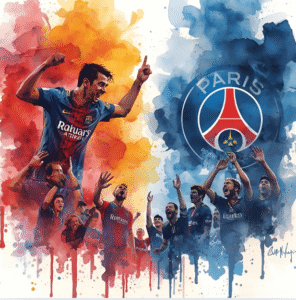Historical Background
The history between Barcelona and Paris Saint-Germain (PSG) is filled with notable moments that have contributed to their reputation as two of Europe’s elite football clubs. Their rivalry extends beyond simple competition, embodying the contrasting styles and cultures of the teams and their cities. Barcelona has long been associated with a philosophy of beautiful, possession-based soccer, a tradition ingrained in the club’s identity through decades of success on both the domestic and European fronts. PSG, by contrast, has risen to international prominence more recently, with significant investments transforming the club into a modern powerhouse.

The roots of their competitive relationship can be traced back to the 1990s, when they first crossed paths in European competitions. Even in those earlier encounters, the clashes revealed the potential for drama and high-quality football. Over the years, their meetings have come to symbolize the evolution of the modern game, with both clubs representing the ambition and global reach of contemporary soccer.
Barcelona’s rich history includes multiple UEFA Champions League titles and a legacy of players who have defined generations. PSG, although newer to this level of competition, has made its mark with marquee signings and bold aspirations to establish itself as a dominant force in Europe. The contrast between the long-standing traditions of Barcelona and PSG’s meteoric rise has added an extra dimension to their rivalry, making their encounters highly anticipated events.
The significance of their meetings often extends beyond the pitch. These matches are a showcase of football’s global appeal, drawing fans and media attention from every corner of the world. As two of the sport’s most marketable and influential clubs, their clashes often spark discussions about tactics, talent, and the direction of modern soccer. Each encounter is not only a test of skill but also a reflection of the pressures and expectations placed upon clubs with such immense stature.
Famous Matches
The clashes between Barcelona and PSG have produced some of the most thrilling moments in modern football. Among these, the 2016-2017 Champions League Round of 16 stands out as a landmark in the competition’s history. PSG dominated the first leg in Paris with a resounding 4-0 victory, leaving Barcelona seemingly out of contention. The result was a masterclass in offensive efficiency and defensive discipline, with PSG capitalizing on their speed and precision to dismantle Barcelona’s game plan.
What followed in the second leg at Camp Nou was nothing short of extraordinary. Barcelona needed at least five goals to overturn the deficit and produced a performance that defied expectations. Neymar, in particular, was instrumental during the final stages of the match, delivering a free kick, a penalty, and an assist in a span of just a few minutes. Sergi Roberto’s late winner sealed the 6-1 result, completing a 6-5 aggregate comeback that stunned the football world. This game remains one of the most iconic examples of determination and unpredictability in the sport.

The rivalry has seen other significant encounters as well, including the 2020-2021 Champions League Round of 16. This time, PSG had their moment of dominance, led by a stunning performance from Kylian Mbappé. In the first leg at Camp Nou, Mbappé scored a hat-trick, helping PSG secure a 4-1 victory. Barcelona attempted to mount a response in the second leg, but PSG held firm, securing a 1-1 draw in Paris and advancing on aggregate. The match highlighted PSG’s growth as a team capable of handling immense pressure and achieving results against formidable opponents.
Other notable meetings, such as their clashes during the group stages of previous tournaments, have showcased the evolving dynamics between the clubs. Whether it’s Barcelona’s commitment to possession-based play or PSG’s ability to unleash devastating counterattacks, these matches have consistently delivered high-stakes drama and quality. These moments have not only provided entertainment for fans but have also helped define the competitive spirit of modern European soccer.
Current Team Analysis
Barcelona enters the match with a strong emphasis on controlling the game through their midfield. Their ability to dictate tempo stems from technically skilled players who excel in maintaining possession and creating opportunities. However, one of the pressing issues for Barcelona lies in their defensive organization, particularly when opponents exploit spaces left during their forward pushes. Injuries and limited squad depth in certain positions further add to the challenges, forcing them to rely heavily on key players to perform consistently over demanding fixtures.
On the other side, PSG boasts an attacking lineup that is among the most dangerous in Europe. Their forward players possess not only speed but also exceptional finishing ability, making them lethal during counterattacks and transitional play. This offensive strength is complemented by creativity in the midfield, which enables them to supply decisive passes to their attacking unit. Despite these advantages, PSG has displayed moments of defensive fragility, particularly when facing teams that apply coordinated pressure. Their tendency to commit players forward can leave gaps at the back, which disciplined opponents can exploit.
Both teams have shown contrasting approaches to managing games, and this clash provides a fascinating look at their current forms.
Star Players to Watch
Barcelona’s lineup features an exciting mix of emerging talents and experienced players who have become the backbone of their squad. Among them, the midfielders stand out as key figures in orchestrating the team’s attacking rhythm, capable of threading precise passes and controlling the flow of the game. Additionally, the team’s attackers are tasked with finding spaces within tight defensive setups, relying on their technical abilities and creative instincts to make decisive contributions in the final third.
PSG’s forward line continues to be one of the most formidable in the game. Their attackers excel in one-on-one situations, often using their pace and skill to break down defenses. The playmakers in the midfield play a pivotal role in linking up with the forwards, ensuring that scoring opportunities are maximized during transitions. The versatility of PSG’s attacking players allows them to adapt to various scenarios, whether it’s building from the back or capitalizing on quick counterattacks.
On the defensive side, standout performers from both teams add to the intrigue. Barcelona’s defenders are expected to remain alert to the explosive pace of their opponents, with an emphasis on staying compact during transitions. PSG’s backline, in turn, faces the challenge of neutralizing Barcelona’s intricate passing game, requiring composure and physicality to manage the pressure.
Key moments often hinge on individual brilliance, and both squads possess players capable of delivering match-defining contributions under the spotlight.
Tactical Approaches
Barcelona often aims to control matches by dominating possession, using short and precise passes to draw opponents out of position. Their attacking buildup typically starts from the back, with defenders and midfielders tasked with maintaining composure under pressure and creating opportunities for forward players. This method requires patience, as the team prioritizes constructing chances through intricate play rather than relying on long balls or rushed decisions. Their fullbacks frequently push forward to add width, contributing to overloads on the flanks and increasing the variety of their offensive movements.

PSG, in contrast, tends to focus on exploiting spaces with quick transitions and direct play. Their midfielders and defenders are adept at launching counterattacks immediately after regaining possession, often bypassing multiple lines of opposition through vertical passes. This approach leverages the individual strengths of their forward players, who excel at turning limited opportunities into high-quality scoring chances. By keeping their attackers ready to pounce on loose balls and defensive lapses, PSG can capitalize on the smallest openings in their opponent’s setup.
One key area of contrast lies in their defensive strategies. Barcelona typically relies on a high defensive line to compress the field and restrict space for their opponents. This requires their players to stay highly coordinated and disciplined, as any misstep can leave them vulnerable to breakaways. PSG, meanwhile, is comfortable dropping deeper when necessary, absorbing pressure and using their defensive solidity as a platform to spring forward. Their players are trained to react quickly when possession changes, allowing them to balance defense and offense effectively during key moments.
Another element shaping these tactical battles is the intensity of pressing. While both teams employ pressing tactics, the style and execution differ significantly. Barcelona favors a coordinated press higher up the field, seeking to force mistakes and recover possession in dangerous areas. This strategy can unsettle opponents and disrupt their rhythm but also carries the risk of exposing their backline if the press is bypassed. PSG’s pressing, on the other hand, is often more situational, with players targeting specific moments to apply pressure. This allows them to conserve energy while remaining unpredictable, making it harder for opponents to anticipate their defensive approach.
Set pieces also present an intriguing tactical dimension. Barcelona’s focus tends to remain on precision and movement, utilizing rehearsed routines to create scoring opportunities in dead-ball situations. PSG, however, often combines physicality with technical ability during set pieces, making them a threat in aerial duels as well as in executing quick and innovative strategies.
Both teams face challenges in adapting their tactics during the match. Barcelona must be cautious not to overcommit when attacking, as PSG’s speed on the counter can be devastating. Conversely, PSG needs to balance their direct play with moments of composure to avoid conceding possession cheaply.
Fan and Media Perspective
The rivalry between Barcelona and PSG ignites passionate reactions from fans and garners widespread media attention with every encounter. For supporters, these matches are not just about the outcome on the field but also a representation of their club’s identity and standing in the football world. Barcelona fans, deeply connected to the traditions of their team, often view these games as an opportunity to demonstrate the enduring strength of their playing philosophy and commitment to success. PSG fans, on the other hand, see such clashes as critical moments in the club’s ongoing quest for European dominance, highlighting the rapid rise of their team on the global stage.
From a media perspective, the storylines surrounding Barcelona and PSG meetings are equally compelling. Coverage often delves into the contrasting strategies and styles of the two clubs, emphasizing the tension between tradition and modernity that these encounters encapsulate. Analysts dissect every tactical adjustment and key moment, offering detailed insights into how each team approaches the high-stakes nature of the contest. Beyond the technical aspects, the media also spotlights the emotional intensity of these games, focusing on the players’ individual brilliance and how their performances could shape the narratives of their careers.
The broader football community closely follows these games as well, given the larger-than-life figures involved and the stakes associated with such high-profile matches. Social media buzz intensifies in the lead-up, with debates and predictions dominating online platforms. Fans engage in discussions that reflect both optimism and anxiety, with each group fiercely defending their side. Highlights, interviews, and expert opinions further fuel the excitement, ensuring the match remains a talking point long after the final whistle.
What makes these games particularly special is the sense of unpredictability. Whether it’s the stunning comeback by Barcelona in 2017 or PSG’s dominance in later meetings, these clashes are rarely short on drama. The possibility of witnessing iconic moments keeps fans and media alike on edge, as each match brings a new chapter to the ongoing saga of their rivalry.
Beyond the footballing action, the cultural and commercial aspects also play a role in shaping perceptions of the rivalry. These games serve as showcases for the global appeal of the sport, drawing millions of viewers from diverse backgrounds. Sponsors, broadcasters, and clubs alike capitalize on the massive interest, making these matchups not just a sporting event but a worldwide spectacle. This level of attention amplifies the pressure on players and coaches, with every decision and performance scrutinized by fans and pundits alike.
In addition to the on-field competition, the focus often shifts to the broader implications of the result. For Barcelona, victory reinforces their standing as a club with a storied legacy and a commitment to excellence. For PSG, triumph represents another step toward cementing their place among Europe’s elite. These implications extend to the players as well, as their performances in these matches often shape reputations and define legacies.
Ultimately, the rivalry between Barcelona and PSG captures the essence of modern football—rich in history, driven by ambition, and followed with unwavering passion by fans and media around the globe.
